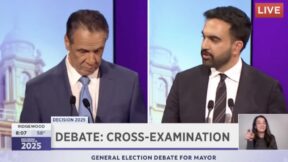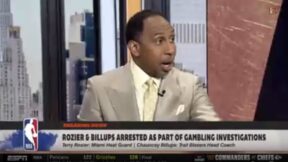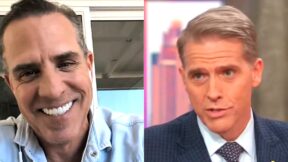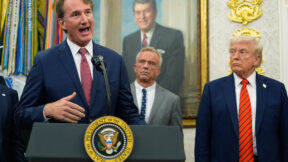Trump Defender Stuns CNN Anchor in Brawl Over White People and Slavery: ‘What Exactly Are You Talking About?’
Fitness influencer and Trump defender Jillian Michaels stunned CNN anchor Abby Phillip with her argument about White people and slavery during a heated exchange on President Donald Trump’s push to “review” history in museums.
President Donald Trump has spent years defending Confederate monuments and pushing against problematic aspects of U.S. history, including widely-mocked purges of information deemed to be “DEI”-related. Most recently, he’s been leaning on Smithsonian museums to review and revise their content to reflect Trump’s views.
On Wednesday’s edition of CNN NewsNight, anchor Abby Phillip discussed the issue with a panel comprised of Scott Jennings, Jillian Michaels, Rep. Ritchie Torres (D-NY), Julie Roginsky, and Elie Honig.
Michaels bristled when Roginsky brought up slavery as a subject for “review,” leaping to shield the White race from shouldering all of the blame and then lashing out at Phillip by claiming she “racialized” the argument.
Phillip pushed back hard, at one point telling Michaels, ” You brought up the question of whether or not slavery in the United States is about race. The answer is yes”:
MICHAELS: Can you address some of those things that are in there? Have you looked at some of the things that are being reviewed?
ROGINSKY: Yes, slavery was a bad thing that we should talk about.
MICHAELS: He is not whitewashing slavery.
ROGINSKY: So, he’s not?
MICHAELS: He’s not. No.
ROGINSKY: Okay.
MICHAELS: He’s not. And you cannot tie imperialism and racism and slavery to just one race, which is pretty much what every single exhibit does. But let’s talk about the fact that when you — let’s talk about the fact —
TORRES: I mean, slavery in America was white supremacy.
MICHAELS: Do you know that only less than 2 percent of white Americans owned slaves.
TORRES: But it was a system of white supremacy. You know, African Americans were slaves and white people were —
MICHAELS: Do you know what the first race to try to end slavery?
(CROSSTALKS)
PHILLIP: I’m really surprised —
MICHAELS: Do you realize that —
PHILLIP: Jillian, I’m surprised that you’re trying to litigate who was the beneficiary of slavery and who was not.
MICHAELS: I’m not, what I’m trying to tell you is that —
PHILLIP: I mean, in the context of American history —
MICHAELS: Okay.
PHILLIP: In the context of American history, what are you saying is incorrect by saying that it was white people oppressing black people.
MICHAELS: Every single thing is like, oh, no, no, no, this is all because white people bad. And that’s just not the truth. Like for example, every single exhibit, I have a list of every single one, like people migrated from Cuba because white people bad. Not because of past — yes. No, it’s in there. That’s what I’m saying. You don’t actually know what’s in there.
Do you know that when you walk in the front door, the first thing you see is the gay flag?
PHILLIP: Jillian, you have a lot of stuff in front of you.
MICHAELS: Yes, I do because I don’t — because here’s the thing.
PHILLIP: What exactly are you talking about?
MICHAELS: Okay. I’ll give you an example.
PHILLIP: Yes, please.
MICHAELS: There’s one called Change Your Game, right? This has been an installation there. Is gender testing fair in sports? Does that — and then it goes on to talk about how it’s complex to do gender testing in sports. It’s not complex. It’s basic science. That’s untrue. It’s XX chromosome XY chromosome. That’s sports. Is it fair to have biological men competing against biological women in sports? No. But why is this in the Smithsonian? So, it’s been completely captured and it’s totally partisan.
PHILLIP: First of all, we don’t have time to litigate all of this.
MICHAELS: Of course, we don’t because then you’re going to lose the argument. And if everything is racialized, just like you’re trying to do to me now.
PHILLIP: Excuse me?
MICHAELS: It’s like, oh, I can’t believe you’re trying to suggest —
PHILLIP: Just to be clear, you brought up race.
MICHAELS: No.
PHILLIP: This was a conversation about the arts and you brought up race.
MICHAELS: It isn’t though.
PHILLIP: You brought up —
MICHAELS: But the whole point of this is that the issue —
PHILLIP: You brought up slavery and you brought up the question of whether — hold on.
MICHAELS: I actually didn’t. You did.
PHILLIP: You brought up question of whether or not slavery in the United States is about race. The answer is yes.
MICHAELS: No, I didn’t.
PHILLIP: Slavery to the United States is all about race.
MICHAELS: No, don’t straw man my argument because that’s not what I said.
PHILLIP: So, what are you talking about?
MICHAELS: Shame on white slavery, and what I was talking about is that this isn’t really about that. When you make every single exhibit about white imperialism, when it isn’t relevant at all, that is a problem. So, when you’re talking about Cubans leaving Cuba and you make it about white people bad, that’s not accurate. That’s my point.
PHILLIP: All right. We’re going to move on to that.
Watch above via CNN NewsNight.




